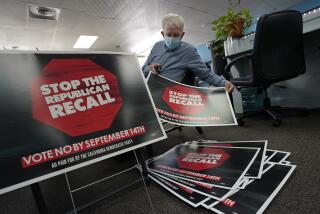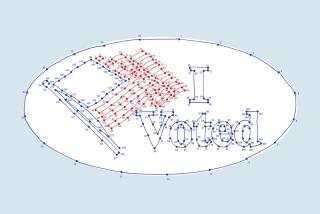Law and Logic Should Delay Measure on Race
- Share via
The Racial Privacy Initiative, which would prohibit governments in California from gathering data about the racial effect of their activities, is set to be on the Oct. 7 recall ballot. The timing is a legal mistake and a policy mistake as well.
San Francisco attorney Jon B. Eisenberg has filed a lawsuit in the California Supreme Court challenging the initiative’s inclusion on the October ballot. The court should follow the law, which clearly requires that the measure be voted on in the primary election in March.
Eisenberg’s petition makes a straightforward argument. The California Constitution provides that a qualified initiative go before the voters “at the next general election held at least 131 days after it qualifies or at any special statewide election held prior to that general election.” The assumption has been that a recall election is a “special election.”
But the California Constitution and the Elections Code distinguish between the two, defining three kinds of elections: general elections, special elections and recall elections. Special elections fill vacancies in the Assembly, state Senate, House of Representatives and U.S. Senate. The governor can also call a special election just to vote on an initiative. Recall elections, in contrast, are called only to decide whether to remove an elected official from office.
Special elections and recall elections are provided for in entirely different sections of the Constitution and the Elections Code, further indicating that recall elections are not a form of special election.
As for the policy problem, placing the Racial Privacy Initiative on the October ballot doesn’t allow time for voters to properly make up their minds. California law provides that general elections and special elections be scheduled well in advance, which permits thorough debate on issues. Recall elections occur unpredictably, and once a recall is certified, the election comes very quickly.
The Racial Privacy Initiative raises issues of profound importance. Its supporters believe that it would ensure a colorblind government. Its critics say it assumes that ignorance is better than knowledge and that it would keep the government from discerning whether its policies are racially discriminatory. A thorough debate on these positions is unlikely with just weeks to go before the election, especially given the importance of recall itself.
A decision to delay a vote on the Racial Privacy Initiative would favor neither its supporters or its opponents. The California Supreme Court should follow the law and direct that the initiative be voted on in the next general election, in March 2004.
More to Read
Get the L.A. Times Politics newsletter
Deeply reported insights into legislation, politics and policy from Sacramento, Washington and beyond. In your inbox twice per week.
You may occasionally receive promotional content from the Los Angeles Times.










